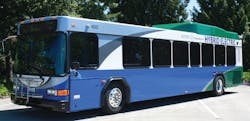More Hybrid Buses Rolling This Summer for Intercity Transit
Intercity Transit is currently preparing seven new hybrid biodiesel electric buses for service this summer. The addition of the newest will bring the bus fleet to about 20 percent hybrid vehicles (13 of 68 coaches). The seven 40-foot coaches join six other hybrid buses which began operating in 2010.
Hybrid diesel electric buses use less fuel, help protect air quality, and minimize harmful emissions that contribute to climate change. Intercity Transit notes that its hybrid buses use about one-third less fuel than its conventional biodiesel coaches, are less costly to maintain, and are well-liked by riders. The hybrid buses have a smooth ride, produce less diesel odor, and are quieter for passengers and the communities they travel through.
The hybrid bus purchase became possible last year when $3,732,500 was awarded through two federal funding sources ($1,732,500 2010 discretionary grant award and $2 million 2010 State of Good Repair grant award). The Intercity Transit Authority authorized the purchase of the 40-foot, low-floor hybrid biodiesel electric vehicles last spring to replace its oldest buses, some in operation since 1996, others since 1998. The total cost of the seven buses, including tax, is $4.6 million. The local capital match amount of $873,000 was paid by Intercity Transit.
Although hybrid buses cost more to purchase than conventional buses, transit officials estimate the agency will recover most of the additional cost in fuel and maintenance savings over the life of the vehicles. As part of its ongoing cost-efficiency efforts, Intercity Transit utilizes an extended lifecycle maintenance program to maximize fleet longevity. Although the Federal Transit Administration recommends a 12-year retirement age for larger buses, Intercity Transit typically keeps their coaches in service for 14 to 15 years.
People can identify the Intercity Transit hybrid buses by their domed roof and demarcation as hybrid electric. Use of low-emission and efficient fuels is part of the agency's commitment to sustainability. Intercity Transit received significant attention in the early 2000s for being one of the first transit systems in the nation to fuel its entire fleet of buses with biodiesel. Two years ago, the agency introduced the first hybrid biodiesel electric buses in the south Puget Sound region. This work – and other earth- and resource-friendly practices - earned the Intercity Transit the nation's first-ever Gold sustainability ranking by the American Public Transportation Association this past spring.
"Using public transportation is one of the most effective ways to reduce your carbon footprint," says Mike Harbour, Intercity Transit General Manager. "We are pleased to make transit even greener with more hybrid buses operating in our community."
